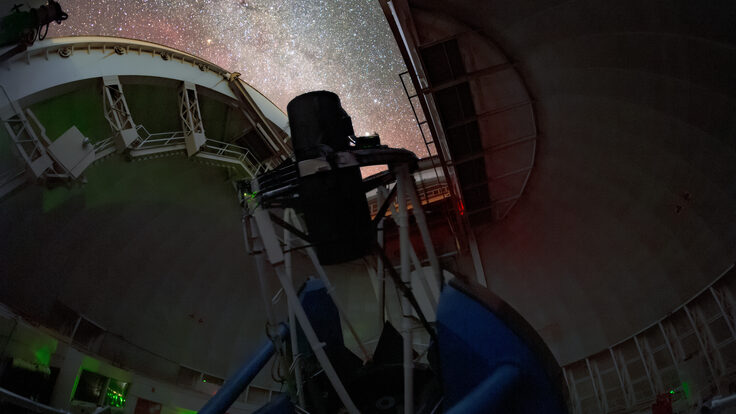Working outside the accelerator
By Jennifer Yauck
|
David Kestenbaum, whose Harvard doctoral thesis focused on the discovery of the top quark, crawls through a cave while covering a story for National Public Radio.
Photos: Jessica Goldstein, NPR |
|
 |
 |
|
Gregory Jaczko, one of five commissioners on the US Nuclear Regulatory Commission, completed a doctorate in theoretical particle physics at the University of Wisconsin-Madison before pursuing a career in policy.
Photo: Todd Schvaneveldt |
|
 |
 |
|
Saxophonist John Butcher, who holds a doctorate in theoretical particle physics from Imperial College in London, performs at the Vancouver Jazz Festival.
Photo: Brad Winter |
|
|
A former theoretical physicist at the University of Michigan-Ann Arbor, Robin Stuart now builds financial models as a head quantitative analyst for Merrill Lynch.
Photo: Merrill Lynch |
|
 |
 |
|
Valerie Jamieson completed a postdoctoral fellowship in experimental particle physics at Oxford, and then went on to become physics features editor at New Scientist magazine.
Photo: Anita Staff |
A PhD in particle physics can be a stepping stone to a career outside physics research.
It’s a weekday morning and a man’s voice comes over the radio: “Here’s the thing about life in a cave: You don’t often get the chance to mate with things in other caves. So these little creatures—after generation and generation, thousands of years—evolve, and sometimes become their own species, unique in the world.”
The voice belongs to David Kestenbaum, science correspondent for National Public Radio, who on this day is talking about biologists searching for undiscovered organisms in the caves of Tennessee. Tune in another day, however, and he might be reporting on the shelf life of plutonium in nuclear weapons, the engineering of levees in New Orleans, or the latest launch of a space shuttle. Although he is a journalist by profession, science is a natural beat for Kestenbaum: he holds a PhD in particle physics.
Particle physics research, in fact, may have once seemed the career that Kestenbaum—who worked at Fermilab while still in high school—was most certainly headed towards. But after completing his doctorate, he stepped off the research path. “I had been doing physics for so long, and I felt like I hadn’t really looked around,” he says. “So I took a walk from it and came across something interesting.” That “something” was journalism, and it has been his career ever since.
“It’s important for people in Washington to have a general understanding of the scientific process.”
Like Kestenbaum, other particle-physics practitioners have also ventured from the research path to explore other career options. The stages at which they leave vary, as do their reasons for pursuing alternate professions. Some continue to apply their physics skills and knowledge, be it directly or indirectly, in their new careers; others are removed enough to simply view the field from afar, as enthusiasts. But most, if not all, find that their rendezvous with particle physics—no matter how long or short—has been valuable.
Taking a different path
When young students of physics look to the future, chances are they envision a career in research. And perhaps it’s no wonder: The notion that a physics education ultimately leads to a research destination is deeply ingrained in the field’s culture. For many, it’s also something of an automatic assumption, maybe even an unconscious expectation, that those who enter the discipline will not only aim for that destination, but will get there by a series of clearly defined steps: bachelor’s degree, doctoral degree, postdoctoral fellowship, assistant professorship, associate professorship, full professorship.
Although research is a noble pursuit, the reality is that it isn’t the only career that people with a background in particle physics choose to pursue. Furthermore, it is but one option of many that new recruits to the field need consider.
People choose careers outside traditional particle physics for a variety of reasons and at various points in their professional development. For some, including Kestenbaum, it’s a matter of discovering what they are good at or where their passions lie. When Gregory Jaczko was finishing his doctorate in theoretical particle physics, he began noticing that his penchant for science policy work was taking up a lot of his time. “I started to think I should pay attention to my hobby,” he says. And so he did. After graduating, he tried his hand as a congressional science fellow for US Representative Edward Markey. The work was a good fit for him, and soon his hobby became his profession. After his fellowship, he went on to serve as science policy advisor and appropriations director for US Senator Harry Reid. Today, Jaczko is one of five commissioners heading the US Nuclear Regulatory Commission, the federal agency responsible for overseeing matters related to nuclear energy and safety.
Both Kestenbaum and Jaczko still find science entwined in their current professions, but that’s not necessarily the case for everyone who follows their passion to a different career. Growing up in England, John Butcher had interests in both music and physics. But at the school he attended, “you did either arts or sciences,” he says, so he chose the sciences, a path he eventually followed all the way to a doctorate in theoretical particle physics. Over the course of the years he spent studying science, Butcher remained involved in music and was developing into a serious saxophonist. By the time he finished his PhD, he realized he couldn’t do both physics and music to the standards he hoped to achieve, and, he says, “I felt I had to go with one or the other.” This time, he chose music. “Music is a much more social activity, and I felt that was a healthier option for me,” he says. Now a professional saxophonist (who “would like to live long enough to know if the Higgs exists”), Butcher has recorded over 50 albums and toured in North America, Europe, and Japan.
Sometimes the decision to pursue a career outside of research is less about passion, as it was for Butcher, and more about practicality, as turned out to be the case for Robin Stuart. After nearly two decades of work in theoretical particle physics, the former assistant professor now has a second career as a quantitative analyst, or “quant,” for the financial institution Merrill Lynch. Stuart was attracted to finance after his area of work, high-precision physics, began to wind down at his institution, the University of Michigan, Ann Arbor. “It was the right moment to step out,” he says. And, he notes, it’s not a bad thing to be a spectator. “I have weekends off now,” he jokes.
“I can really appreciate that there is a very human side to particle physics that most people outside of particle physics simply don’t see.”
Physics applied
No matter the reason behind it, the decision to leave particle physics after dedicating effort, time, and money to the pursuit may stir up a disconcerting question: Was it all for naught? Not necessarily. Many particle physics practitioners find that their training serves them exceedingly well in their chosen careers. Skills that physicists can easily take for granted, such as the practice of critical thinking, are often prized in other professions.
Jaczko says that his physics background taught him how to “tackle and analyze problems” as a policy maker. What’s more, Jaczko points out, a need exists in government and policy for people with a background in physics or other sciences. “Some of the most important issues rest on scientific or technical questions,” he says. “It’s important for people in Washington to have those kinds of skills, and to have a general understanding of the scientific process.”
Training in particle physics provides more than just analytical skills, however. “The quantitative training from physics is second to none,” says Stuart. As a quant at Merrill Lynch, Stuart draws heavily on his own math skills, building models to analyze the financial risks of the firm. Physicists make natural quants, he says, because they “speak the language” necessary for developing the kinds of complex models that are used in finance. The finance world, in fact, has attracted many physicists over the years.
In still other disciplines, knowledge of particle physics is itself a more valuable asset than analytical or quantitative skills. After completing postdoctoral work in experimental particle physics, Valerie Jamieson eventually went on to become New Scientist’s physics features editor, a role that requires her to stay atop the latest developments in the field and determine content for the magazine. Her knowledge comes in handy on the job, giving her perspective on the science she encounters as she talks with physicists, attends conferences, and reads scientific journals. “It helps me spot interesting papers that have obscure titles and don’t scream out ‘important discovery,’” she says. In addition, she knows firsthand the “ingenuity, blood, sweat, and tears” that go into building a particle detector. “I can really appreciate that there is a very human side to particle physics that most people outside of particle physics simply don’t see,” she says. “I can bring that to a much wider audience.”
Reflections on leaving
When you ask people who left particle physics research why they entered the field in the first place, their answers are often filled with enthusiasm and peppered with words like “mind-blowing” and “fascinating.” Many speak of the thrill of explaining the supposedly inexplicable, of unlocking the secrets of the universe and how it ticks. “It wasn’t walking on the moon,” says Kestenbaum of his time at Fermilab, “but it felt close.”
And so it may not be surprising that a healthy dose of soul searching sometimes precedes the decision to leave the field for a different career. “It was a leap,” says Jamieson, who thought long and hard before making her decision to pursue journalism. “I felt if I left research, I wouldn’t be able to get back into it.” Nor is it necessarily surprising that those who make the leap sometimes feel pangs of nostalgia. Jaczko, for instance, says at times he misses the work and daily learning of his graduate school days, and Kestenbaum admits he is “sometimes envious” when he interviews a scientist after a great discovery.
Yet, in spite of the fascination with particle physics and the moments of soul searching and nostalgia, many people who leave research seemingly have little regret about the move, and in fact speak of their new careers as enthusiastically as they speak of particle physics. “I can’t think of any other place I’d want to be,” says Kestenbaum.
At the same time, they appreciate the role physics played in getting them to where they are now, and they value the skills and knowledge they developed during their training. Many even say they would still go the same route if given the chance to do it all again. For them, particle physics may not have been the final destination, but unquestionably it has been a vital part of the journey.
Click here to download the pdf version of this article.






